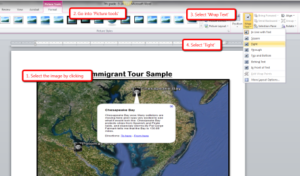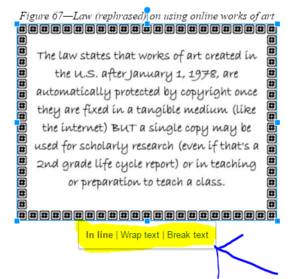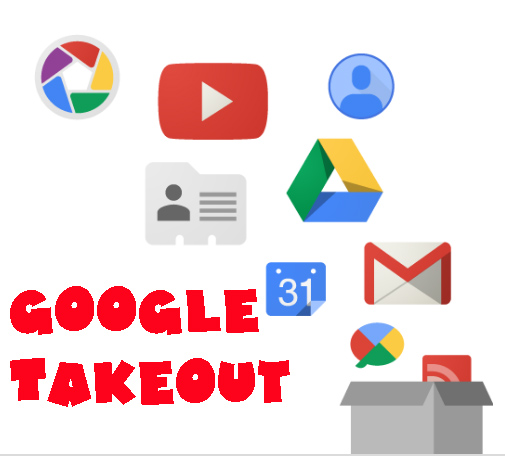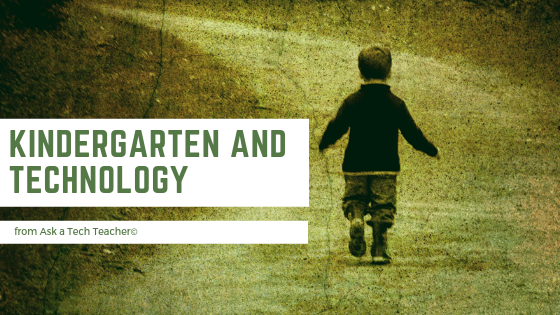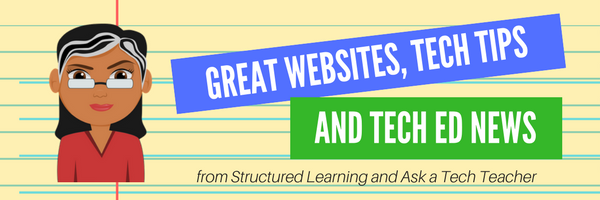Author: Jacqui
Dear Otto: Help With Classroom Management Problems
 Dear Otto is an occasional column where I answer questions I get from readers about teaching tech. If you have a question, please contact me at askatechteacher at gmail dot com and I’ll answer it here.
Dear Otto is an occasional column where I answer questions I get from readers about teaching tech. If you have a question, please contact me at askatechteacher at gmail dot com and I’ll answer it here.
BTW–lots of people ask why the name ‘Otto’. It’s a palindrome so beloved by geeks and nerds and techie-sort of folk.
I got this question from a colleague::
I teach computer literacy. K-4 teachers line their students up and they arrive all at one time, so with this age it would be easier to give instruction before everyone is seated. However, it is still difficult because I don’t really have enough open floor space to seat them away from their computer.
Share this:
- Click to share on Facebook (Opens in new window) Facebook
- Click to share on X (Opens in new window) X
- Click to share on LinkedIn (Opens in new window) LinkedIn
- Click to share on Pinterest (Opens in new window) Pinterest
- Click to share on Telegram (Opens in new window) Telegram
- Click to email a link to a friend (Opens in new window) Email
- More
169 Tech Tip #12 Wrap Text Around a Picture
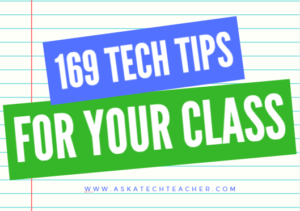 In these 169 tech-centric situations, you get an overview of pedagogy—the tech topics most important to your teaching—as well as practical strategies to address most classroom tech situations, how to scaffold these to learning, and where they provide the subtext to daily tech-infused education.
In these 169 tech-centric situations, you get an overview of pedagogy—the tech topics most important to your teaching—as well as practical strategies to address most classroom tech situations, how to scaffold these to learning, and where they provide the subtext to daily tech-infused education.
Today’s tip: #12–Wrap Text around a Picture
Category: Images
Sub-category: MS Office, Google Apps
Q: I want my text to wrap around the picture I inserted, but it goes under/above it. There’s a big white space I can’t type in. What do I do?
A: I get this from students a lot. Here’s what you do in MS Word:
- select the image
- select the ‘Pictures’ tab at the top of the screen
- select ‘wrap text’ from the ribbon
- select ‘tight’ from drop down menu
Text now flows around the picture
In Google Apps, click the image and select ‘wrap text’ from the three options:
Sign up for a new tip each week or buy the entire 169 Real-world Ways to Put Tech into Your Classroom.
Share this:
- Click to share on Facebook (Opens in new window) Facebook
- Click to share on X (Opens in new window) X
- Click to share on LinkedIn (Opens in new window) LinkedIn
- Click to share on Pinterest (Opens in new window) Pinterest
- Click to share on Telegram (Opens in new window) Telegram
- Click to email a link to a friend (Opens in new window) Email
- More
Have Google Takeout at Your End-of-Year Party
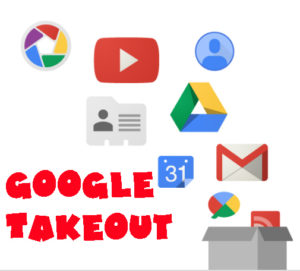 One of the most difficult chores teachers perform at the end of the school year is not final grades, saying goodbye to students, or wondering how to fill their summer free time. It’s preserving the digital files that made up their school year. Be it to close out one school year in preparation for the next, transfer student files to the next class, or the need to safely and effectively transfer teacher files to a new job, handling digital files for use later is stressful. In fact, teachers self-report that this task is one of the most stressful of their end-of-year chores.
One of the most difficult chores teachers perform at the end of the school year is not final grades, saying goodbye to students, or wondering how to fill their summer free time. It’s preserving the digital files that made up their school year. Be it to close out one school year in preparation for the next, transfer student files to the next class, or the need to safely and effectively transfer teacher files to a new job, handling digital files for use later is stressful. In fact, teachers self-report that this task is one of the most stressful of their end-of-year chores.
There are a lot of products to address this nerve-wracking activity. That’s not the purpose of this article. Here, I’ll concentrate on schools that use Google products. That includes Google Classroom as an LMS, Google cloud as a digital portfolio, Gmail as an email program, YouTube to deliver videos, and other apps (like Google Sites and Blogger) included in the Google ecosystem. If this applies to you, you’re in luck. Google’s free product, Google Takeout, is one of the simplest available. It requires no installation, no new hardware, and is already part of the Google you already use. Google Takeout automates the download of your Google data across all Google services, making it ready to be uploaded to new accounts or preserved as a back-up. This includes but is not limited to:
- Gmail
- Google Apps (but not all of them)
- Google+
- Google Calendar
- Google Contacts
- Google Drive files
- Google Keep
- Google Voice
- YouTube
How does it work
Whether you use Google at your school or as an individual, you’ll be pleased to learn that the Takeout process is intuitive. Here’s what you do:
Share this:
- Click to share on Facebook (Opens in new window) Facebook
- Click to share on X (Opens in new window) X
- Click to share on LinkedIn (Opens in new window) LinkedIn
- Click to share on Pinterest (Opens in new window) Pinterest
- Click to share on Telegram (Opens in new window) Telegram
- Click to email a link to a friend (Opens in new window) Email
- More
12 Tech Tasks To End the School Year
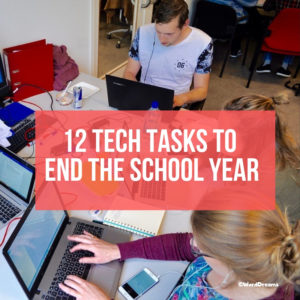 Wrapping up your school technology for the summer is as complicated as setting it up in September. There are endless backups, shares, cleanings, changed settings, and vacation messages that — if not done right — can mean big problems when you return from summer vacation. If you have a school device, a lot of the shutdown steps will be done by the IT folks as they backup, clean, reformat, and maybe re-image your device. If you have a personal device assigned by the school but yours to take home, the steps may be more numerous but really, not more complicated.
Wrapping up your school technology for the summer is as complicated as setting it up in September. There are endless backups, shares, cleanings, changed settings, and vacation messages that — if not done right — can mean big problems when you return from summer vacation. If you have a school device, a lot of the shutdown steps will be done by the IT folks as they backup, clean, reformat, and maybe re-image your device. If you have a personal device assigned by the school but yours to take home, the steps may be more numerous but really, not more complicated.
Here’s a list. Skip those that don’t apply to you and complete the rest. I won’t take time in this article (I’m at about 1000 words right now) for a how-to on each activity so if you don’t know how to complete one, check with your IT folks or Google it:
Make sure your firewall and antivirus programs are working.
Many computers come with a built-in one to keep viruses and malware out that slow your computer. Sometimes, they seem to turn off by themselves (I have no idea why). Check to be sure yours is active. If you have a Chromebook or an iPad, don’t even worry about this.
Clean out your documents.
Sort through the documents you collected this year and get rid of those you don’t need anymore. It’s intimidating, like a file cabinet that hasn’t been opened in months –- or years — and is covered with spider webs. If you don’t do this regularly, the computer must finger through these unused files every time you search. If you hate throwing anything away, create an ‘Old’ folder, toss them all in it, and save that to a flash drive or in the cloud.
Share this:
- Click to share on Facebook (Opens in new window) Facebook
- Click to share on X (Opens in new window) X
- Click to share on LinkedIn (Opens in new window) LinkedIn
- Click to share on Pinterest (Opens in new window) Pinterest
- Click to share on Telegram (Opens in new window) Telegram
- Click to email a link to a friend (Opens in new window) Email
- More
Kindergartners need Technology too!
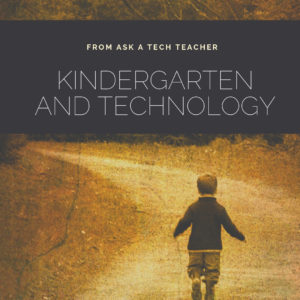 Hi all! I’m off to visit good efriend Norah Colvin over at ReadiLearn to discuss how important technology is even for kindergartners. If you’ve ever wondered about that, come check out my short article on this subject. And leave comments so we can chat!
Hi all! I’m off to visit good efriend Norah Colvin over at ReadiLearn to discuss how important technology is even for kindergartners. If you’ve ever wondered about that, come check out my short article on this subject. And leave comments so we can chat!
Before getting into the article, I want to thank Norah Colvin for inviting me as a guest on her wonderful newly-redesigned education blog, ReadiLearn where Norah covers great topics for the first three years of education., I’ve been a long-time subscriber, always coming away a little smarter on teaching our youngest learners.
A topic dear to me–and one I get lots of questions about–is teaching Kindergartners to Tech.
When I started teaching technology almost twenty years ago, I taught K-8, three classes in each grade every week. I was buried under lesson plans, grades, and parent meetings. I remember suggesting to my principal that he ease my schedule by eliminating tech for kindergartners. They wouldn’t miss anything if I started them in first or second grade.
And back then, that was true. Even a decade ago, technology was an extra class in student schedules where now, it is a life skill. Today, my teacher colleagues tell me kids arrive at school already comfortable in the use of iPads and smartphones, doing movements like swipe, squeeze, and flick better than most adults. Many teachers, even administrators, use that as the reason why technology training isn’t needed for them, arguing, “They’re digital natives.”
Share this:
- Click to share on Facebook (Opens in new window) Facebook
- Click to share on X (Opens in new window) X
- Click to share on LinkedIn (Opens in new window) LinkedIn
- Click to share on Pinterest (Opens in new window) Pinterest
- Click to share on Telegram (Opens in new window) Telegram
- Click to email a link to a friend (Opens in new window) Email
- More
10 Myths about Teaching with Tech
 I’ve been teaching technology for over fifteen years. While student familiarity with this tool has improved, one thing that never varies is the myths surrounding teaching with it. It’s a constant struggle with parents and colleagues who have far more enthusiasm regarding this subject than expertise. Just when I think I’ve got everyone coloring between the lines, things change and I have to get a different paintbrush.
I’ve been teaching technology for over fifteen years. While student familiarity with this tool has improved, one thing that never varies is the myths surrounding teaching with it. It’s a constant struggle with parents and colleagues who have far more enthusiasm regarding this subject than expertise. Just when I think I’ve got everyone coloring between the lines, things change and I have to get a different paintbrush.
Here are ten of the most common face-palming, head-slapping myths that I have to correct:
Kids are digital natives. They get it.
Let’s look at that term, “digital native”. Techopedia defines it as:
a person born or brought up during the age of digital technology and therefore familiar with computers and the Internet from an early age.
I agree about the familiarity. When these “digital natives” show up in my classroom, they have played with iPads and their parents’ smartphones enough to know how to swipe, tap, squeeze, and shake, but they know none of the nuances required to morph the device from a toy to a productivity tool. This is contrary to popular belief — that being raised with iPads means they understand all about them.
To be fair, kids who use technology regularly at home do have both a baseline set of skills and a fearless enthusiasm for anything with a screen and a power button. We adults envy that confidence, so unlike our abject fear that simply touching the device wrong will break it.
But what kids possess is bravado, not knowledge. Knowledge must be taught.
It’s important to remember that lots of kids aren’t raised with technology. The New York Post reported in 2018 that as many as 5 million schoolage children have no Internet access. The reasons vary, everything from their parents don’t believe in it, can’t afford it, don’t trust it, or have no way to connect to the Internet, but the result is the same: No technology for kids considered to be the “digital native” generation.
Share this:
- Click to share on Facebook (Opens in new window) Facebook
- Click to share on X (Opens in new window) X
- Click to share on LinkedIn (Opens in new window) LinkedIn
- Click to share on Pinterest (Opens in new window) Pinterest
- Click to share on Telegram (Opens in new window) Telegram
- Click to email a link to a friend (Opens in new window) Email
- More
Here’s How to Get Started with Ask a Tech Teacher
Hello! Ask a Tech Teacher is a group of tech ed professionals who work together to offer you tech tips, advice, pedagogic discussion, lesson plans, and anything else we can think of to help you integrate tech into your classroom. Our primary focus is to provide technology-in-education-related information for educators–teachers, administrators, homeschoolers, and parents.
Here’s how to get started on our blog:
Read our varied columns
They are numerous and varied, including
- Tech tips
- How-to’s–how to use web tools, software, hardware, more
- Dear Otto–questions from educators on tech questions
- Pedagogy that impacts tech in ed
- Reviews of books, apps, web tools, websites, tech ed products used in your classroom
- Subscriber Specials–monthly discounts (or FREE) on tech ed products
- Humorous life of a tech teacher
Read Hall of Fame articles
Share this:
- Click to share on Facebook (Opens in new window) Facebook
- Click to share on X (Opens in new window) X
- Click to share on LinkedIn (Opens in new window) LinkedIn
- Click to share on Pinterest (Opens in new window) Pinterest
- Click to share on Telegram (Opens in new window) Telegram
- Click to email a link to a friend (Opens in new window) Email
- More
2 Children’s Books You’ll Love
As a teacher, I’m always looking for children’s books for my students. I’m excited to say I’ve found two I think you’ll like:
- Amazing Matilda — A coming of age of a monarch butterfly; delightful
- Sir Chocolate and the Fondant Five story and cookbook
 Amazing Matilda
Amazing Matilda
by Bette Stevens
5/5
Bette Stevens Amazing Matilda: The Tale of a Monarch Butterfly (CreateSpace 2012) is the story of tiny Matilda, a round white creature born from an egg in Nature’s garden with a burning desire to fly. Without wings, though, she knows that can’t happen. Matilda has no idea that in her life, she will morph from the crawly leaf-bound creature to a gorgeous monarch butterfly. She tells her animal friends about her passion to fly and they offer their stories of growing up as well as sage advice any parent would be envious of. For example, her friend Sparrow suggests:
Another friend suggests:
She is frustrated by this good-natured advice because she has no idea how to do what they suggest:
“Sparrow said that I must have patience and that I must follow my instincts. Now, you say I must have wings. Where can I find all of those things?”
As Matilda grows, she changes from a larva to pupa to a gorgeous winged adult. Each stage in Matilda’s amazing journey is accompanied with wonderful drawings that show her progress, who she meets, and how she changes.
As a result, readers are not just entertained by the story but happily learn about the development of a butterfly. There are lots of cute lines, such as:
“Matilda crunched and munched and lunched, leaf after leaf, day after day.”
If you loved P.D. Eastman’s incomparable book, Are You My Mother, about a baby bird’s search for its mother, you must read this book. If Charlotte’s Web is one of your childhood favorites, I say, Move over Charlotte. Matilda is now here!
This is a short book. In fact. This review is almost longer than the story!
 Sir Chocolate and the Fondant Five story and cookbook
Sir Chocolate and the Fondant Five story and cookbook
by Robbie Cheadle
5/5
Robbie Cheadle’s Sir Chocolate and the Fondant Five story and cookbook (2019) is the next in the author’s delightful series of books that blend children’s stories with themed original recipes. This one is a clever story poem about the disappearance of zoo animals and how Sir Chocolate must figure out what happened.
“One day Sir Chocolate arrived, and not a sound could hear, he called long and loud, but no animals did appear. The animals had vanished, the zoo was empty and still,”
“The monkey is naughty, he likes to have fun, he plays tricks on the others, then away he does run.”
The story is written in the format of a poem and includes great photographs that help readers visualize the action. At the completion of the story, there is a cute poem to introduce an original collection of animal-themed recipes children can complete with their parents. Some of the recipes are:
- Sir Chocolate peppermint caramel pudding
- Cheetah Cheese scones
- Rino Soetkoekies
I have bought several of these books because I love the idea of blending a story with cooking and inspiring kids and parents to spend time together. I also love that Robbie writes these books with her son, Michael, each doing their part in writing, cooking, and photographing. Overall, this is another excellent book in a clever collection that not only entertains but brings parents and kids together.
Share this:
- Click to share on Facebook (Opens in new window) Facebook
- Click to share on X (Opens in new window) X
- Click to share on LinkedIn (Opens in new window) LinkedIn
- Click to share on Pinterest (Opens in new window) Pinterest
- Click to share on Telegram (Opens in new window) Telegram
- Click to email a link to a friend (Opens in new window) Email
- More
169 Tech Tip #7 Transparent Backgrounds
 In these 169 tech-centric situations, you get an overview of pedagogy—the tech topics most important to your teaching—as well as practical strategies to address most classroom tech situations, how to scaffold these to learning, and where they provide the subtext to daily tech-infused education.
In these 169 tech-centric situations, you get an overview of pedagogy—the tech topics most important to your teaching—as well as practical strategies to address most classroom tech situations, how to scaffold these to learning, and where they provide the subtext to daily tech-infused education.
Today’s tip: #7–Transparent Backgrounds
Category: Images
Sub-category: Keyboarding
Q: When I insert a picture, the background isn’t transparent, so it covers everything behind it. How do I make it see-through?
A: Two ways to fix that problem:
- Select the picture; use the picture toolbar pen.
- If that doesn’t work, select the picture and then press Ctrl +T.
These don’t work in all cases. It depends upon the image file you’re using. I hope it covers your case.
Sign up for a new tip each week or buy the entire 169 Real-world Ways to Put Tech into Your Classroom.
Share this:
- Click to share on Facebook (Opens in new window) Facebook
- Click to share on X (Opens in new window) X
- Click to share on LinkedIn (Opens in new window) LinkedIn
- Click to share on Pinterest (Opens in new window) Pinterest
- Click to share on Telegram (Opens in new window) Telegram
- Click to email a link to a friend (Opens in new window) Email
- More
Subscriber Special: April
April 5th-15th:
Buy a K-8 School License
get 5 free print books of the grade level you purchased
(domestic purchase or freight-forwarders only)
Usually, you get one desk copy for each grade level included in your school license. Between April 5th and 15th, get five per grade level. That’s enough for a team to each have one.
To take advantage of this special, purchase from Structured Learning with PayPal or with a PO. Email us (admin at structuredlearning dot net) with your proof of purchase. We’ll send the extra books.
What is a school license?
Benefits of a School License
- provide an overarching curriculum map for using technology in your school
- provide access to full text PDF (or videos where relevant) from every digital device in your school, 24 hours a day. This maximizes productivity and student independence.
- enable flexible learning paths as students work at their own pace, with the ability to review or work ahead as needed
- share tech-in-ed pedagogy to infuse your school with technology
- enable teachers to dig deeper into relevant topics, vertically integrate with core grade-level teachers
- provide multiple authentic and organic formative and summative assessment
- provide free online Help via Ask a Tech Teacher (staffed by educators who use SL resources) and grade-specific online resources (for K-5 tech curriculum). This is unique to Structured Learning’s technology curriculum, not found with any other provider.
Benefits of School License for Students
- provide easy access to monthly lessons, how-tos, rubrics, project samples, practice quizzes, grade-level expectations, homework, images, and checklists (grade level Scope and Sequence and the Ready to Move On monthly keyboard workbooks lists, for example)
- provide quick links to websites required in lessons
- provide full color instructions that can be zoomed in on for greater detail
- allow a convenient place to take lesson notes (using a PDF annotator like iAnnotate)
- encourage students to be independent in their learning, work at their own pace rather than a one-size-fits-all class pace. This is great both for students who need more time and those who ‘get it’ and want to move on
- enable a quick way to spiral up to the next grade level for quick learners or back to earlier resources for student needing to scaffold their learning
- provide access to 10 companion videos (Ultimate Guide to Keyboarding curriculum license only) to take students through each month of their keyboarding journey. They’re approximately one hour, viewed at student’s pace
- prepare students for the rigor of end-of-year summative testing
Share this:
- Click to share on Facebook (Opens in new window) Facebook
- Click to share on X (Opens in new window) X
- Click to share on LinkedIn (Opens in new window) LinkedIn
- Click to share on Pinterest (Opens in new window) Pinterest
- Click to share on Telegram (Opens in new window) Telegram
- Click to email a link to a friend (Opens in new window) Email
- More


